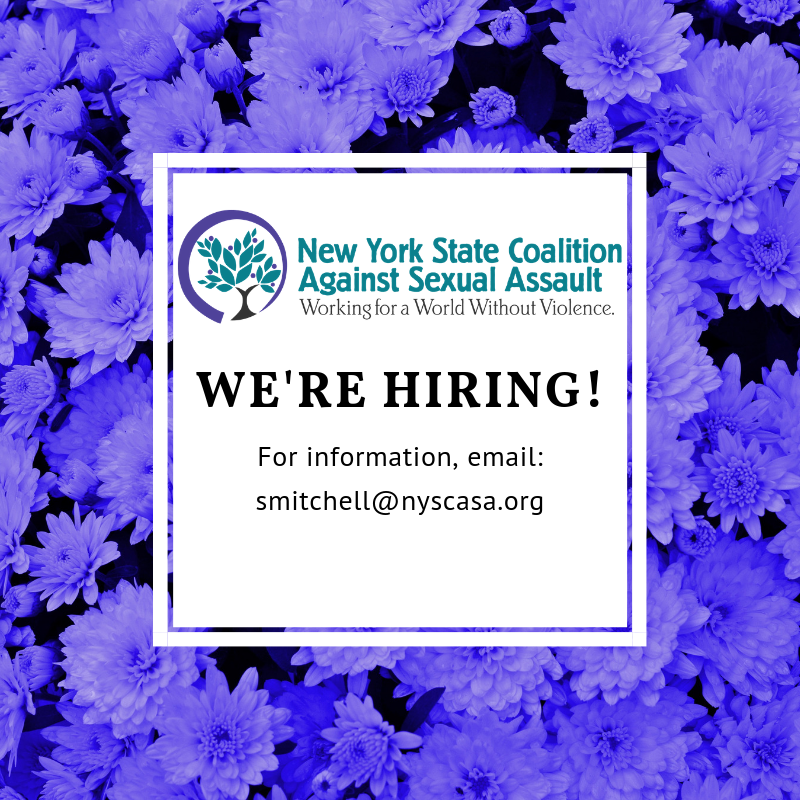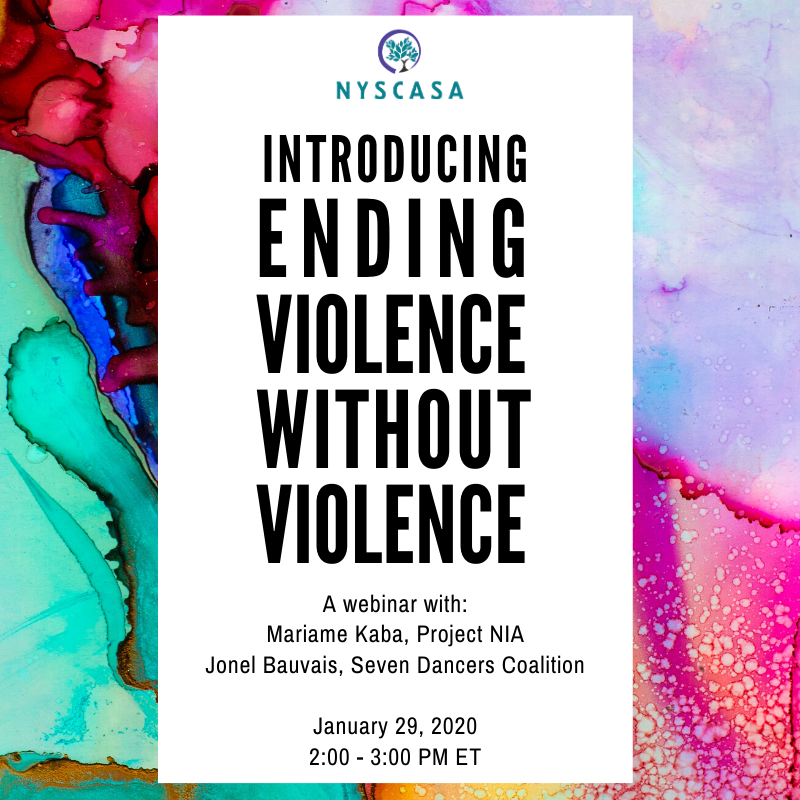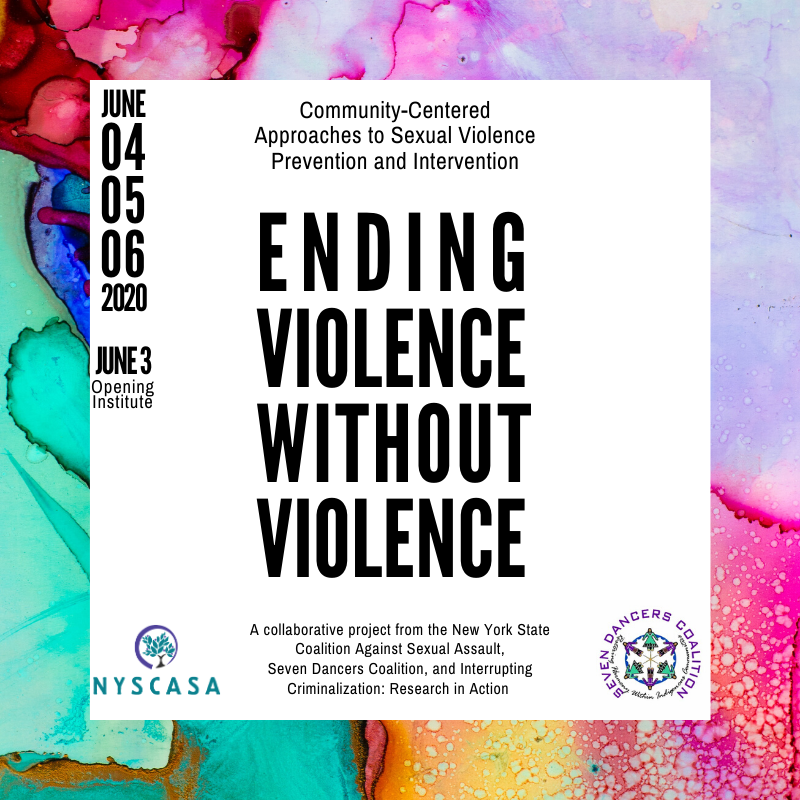07 Jan NYSCASA Monthly Digest – January 2020
Do you have news for NYSCASA to share in our next digest? Email submissions with “Newsletter” in the subject line to Chelsea Miller, Communications Director, at cmiller@nyscasa.org.
Coalition News
Happy New Year from NYSCASA!
Our work would not be possible without you, an extraordinary network of supporters, survivors, advocates, organizers, and professionals. Your support helps us improve responsive services for all survivors of sexual violence and strengthen sexual violence prevention efforts across New York State.
Thank you for being part of this movement to end sexual violence and all forms of oppression. As 2020 begins, we look forward to continuing this work together.
Coming Soon: PREA Portal
NYSCASA is pleased to offer an online portal for PREA advocates in New York State to facilitate collaborating and sharing resources. The PREA Portal is under construction. Stay tuned for more information! If you have ideas or questions, please contact E Bjorkman at ebjorkman@nyscasa.org.
NYSCASA Statement on Closing the ‘Rape Intoxication Loophole’
Under New York Penal Law, if a survivor of sexual violence was voluntarily intoxicated, prosecutors cannot bring a case against the person who has harmed them, even if the survivor did not or was unable to consent to sexual activity. Governor Andrew Cuomo proposes to amend the law so that survivors of sexual violence are protected, regardless of whether they voluntarily or involuntarily consumed alcohol.
NYSCASA commends the Governor’s office for advancing legislation that helps to protect all survivors of sexual violence. Read our full statement here.
 NYSCASA Is Hiring!
NYSCASA Is Hiring!
NYSCASA is currently hiring for two full-time positions at our Albany office:
We are looking for candidates who are dedicated to our mission of ending sexual violence while addressing the intersections of oppression and injustice.
To apply, please submit your cover letter and resume by email to Sam Mitchell at smitchell@nyscasa.org.
Sexual Violence in the News
- CBS6: Cuomo’s 2020 State of the State Proposal: Closing Rape Intoxication Loophole
- Times Union: Sexual Assault Reports at New York Colleges Result in Few Investigations, Sanctions
- ProPublica: We Are Investigating Sexual Violence and Dating Apps
- Vox: Study: More People Reported Sex Crimes Around the World in the Wake of MeToo
- Vox: New Trump Administration Rules on Sexual Assault Could Keep Survivors Silent
- CBS6: Federal Government Investigations into Sex Assaults at RPI
- AP News: Church Offers Little Outreach to Minority Victims of Priests
- The New York Times: ‘I Want to Be Heard’: Adult Sex-Abuse Victims Demand New Rights
- The Washington Post: New York Writer Who Accused Trump of Sexual Assault Sues Him for Defamation
Upcoming Events
 Webinar Series: Ending Violence Without Violence
Webinar Series: Ending Violence Without Violence
NYSCASA is pleased to announce our new webinar series, Ending Violence Without Violence, which will serve as lead-up programming for our conference of the same name (see below). The series will introduce participants to the core principles of Restorative Justice, Transformative Justice, Community Accountability, and other community-centered approaches to violence prevention and response.
Participants will develop a shared analysis of interpersonal violence—specifically sexual violence—and a shared understanding of the importance of community-based approaches to sexual violence prevention and intervention. The webinar series will underscore the importance of building communities that can prevent sexual violence, respond to harm, and heal trauma.
January 29: Introducing “Ending Violence Without Violence”
In this session, participants will learn about the state of efforts to end sexual violence in mainstream and community contexts, how we got here, and where we hope to go. Presenters: Mariame Kaba (Barnard Center for Research on Women) and Jonel Beauvais (Seven Dancers Coalition). Register here: bit.ly/EndViolence2020
February 5: Restorative Approaches to Sexual Violence
This webinar will introduce participants to the core principles of restorative justice. Participants will learn about how restorative practices can be used to address sexual violence. This session will also address concerns and challenges to implementing restorative justice practices. Presenter: sujatha baliga (Impact Justice). Register here: bit.ly/Restorative2020
February 19: Transformative Approaches to Sexual Violence
This webinar will introduce participants to the core principles of transformative justice and community accountability and how these frameworks can be used to address sexual violence. Presenters: Stas Schmiedt and A. Lea Roth (Spring Up). Registration link to come.

Ending Violence Without Violence Conference (Syracuse, NY)
NYSCASA is thrilled to announce that we are co-creating a conference to be held in 2020 with Seven Dancers Coalition, the Indigenous anti-violence coalition in New York State and Haudenosaunee Country, and Interrupting Criminalization: Research in Action, a new project led by Mariame Kaba and Andrea Ritchie at the Barnard Center for Research on Women. The 2020 Sexual Assault Prevention and Intervention Conference will be held in Syracuse, NY, on June 4–6, 2020, with a pre-conference institute on June 3.
This conference will provide a space for survivors, advocates, counselors, victim assistance programs, allied organizations, and community members across New York State and Haudenosaunee Country to develop the knowledge, skills, and courage to implement community-centered practices to prevent and respond to harm and sexual violence.
Speakers and registration information to be announced.
Sign up to receive updates about the 2020 conference here: bit.ly/NYSCASA2020
Webinars
- January 8: Tools for Addressing Gender Bias in Sexual Assault Response
- January 15: Introducing “Enhancing Campus Sexual Assault Prevention Efforts Through Situational Interventions”
- January 15: Adverse Childhood Experiences and Their Relationship to Adult Well-being, Biomedical Disease, and Premature Death
- January 21: Expanding the Frame on Weathering: Impact on Survivors at Intersections of Pregnancy, Race, Sexuality, and Implications for Advocates and Birthworkers
- January 22: A Life Course Framework for Preventing Domestic Violence
- January 23: Evaluating Social Norms and Social Marketing Campaigns for Sexual and Domestic Violence Prevention
- January 28: Restorative Justice as a Response to Campus Misconduct
- January 29: Prevalence of Workplace-Related Sexual Violence: Moving from Context to Creating Protective Environments for Prevention
- January 30: New, Seasoned, or Needing a Refresher: Key Concepts, Models, and Frameworks Within the Field of Sexual and Domestic Violence Prevention
- February 4: Protecting Body Sovereignty: Eliminating the Avoidance and Delay of Healthcare for Survivors of Domestic Violence and Sexual Assault
- February 18: The Abuse of Girls, Women and Gender Non-Conforming People in OBGYN and Prenatal Care: Cross-Sectoral Work and Coordinated Community Response in Prevention and Intervention
- February 27: VAWA Confidentiality: Empowering Survivors and Protecting Information
- March 3: When the Body Speaks: Somatic Language Across the Continuum of Sexual and Reproductive Violations
- March 4: Building Your Trainer Toolbox, Part 1: Using and Citing Research
- March 17: Interrupting Obstetrics Violence in Labor and Delivery: Why It Should Matter to Gender Violence Advocates
- March 31: Ending Maternal Mortality: Implications for Policy, Medical Practice and Culture Change
- May 6: Building Your Trainer Toolbox, Part 2: Training Materials and Professional Tools
New and Noteworthy Resources
 Ask the Researchers: The Sexual Abuse to Maternal Mortality Pipeline
Ask the Researchers: The Sexual Abuse to Maternal Mortality Pipeline
National Sexual Violence Resource Center staff talk with Sevonna Brown, Assistant Executive Director for Black Women’s Blueprint, about BWP’s narrative approach and key findings to a six-year study that interlinks reproductive and sexual violence and the maternal mortality pipeline for women of color and unearths recommendations for reproductive justice and sexual violence prevention collaborations. Listen here. Access the BWP report here.
SOAR for Native Communities Training
The SOAR for Native Communities training is designed to equip those serving Indigenous populations to better understand the issues surrounding human trafficking and its impact in Native communities. It will identify resources relevant to Indigenous populations and will support building of responses to human trafficking in Native communities. Access the training here.
Building Accountable Communities: A Video Series
Accountability is a familiar buzz-word in contemporary social movements, but what does it mean? How do we work toward it? In this series of four short videos, anti-violence activists Kiyomi Fujikawa and Shannon Perez-Darby ask and explore: What does it look like to be accountable to survivors without exiling or disposing those who do harm? Learn more and watch the series here.
 Repairing Harm: A Better Alternative to Punishment
Repairing Harm: A Better Alternative to Punishment
In this blog post and podcast interview, Cult of Pedagogy discusses the practice of repairing harm as an alternative to punishment with Brad Weinstein and Nathan Maynard, authors of Hacking School Discipline: 9 Ways to Create a Culture of Empathy & Responsibility Using Restorative Justice. Read more and listen here.
Report: Restorative Approaches to Intimate Partner Violence
The Center for Court Innovation recently released a report that documents how restorative approaches are currently being applied to intimate partner violence (A.K.A. domestic violence) in the United States. Through surveys and site visits at 34 programs addressing intimate partner violence and/or sexual assault through restorative, indigenous, culturally-based, or transformative approaches, the study’s findings inform a set of guiding principles and practice recommendations for the field. Read the full report here.


